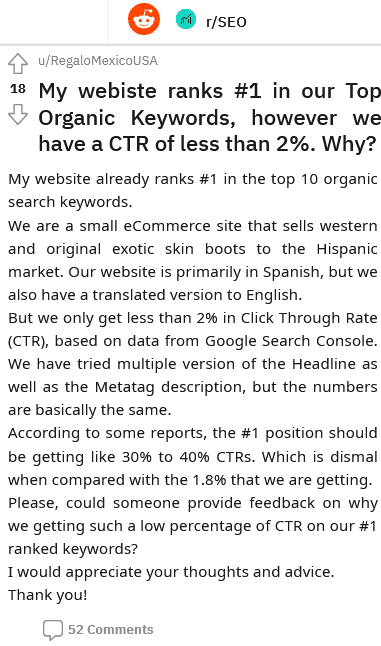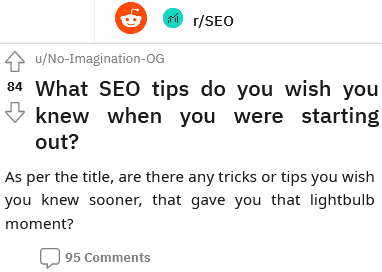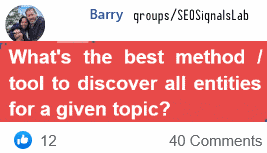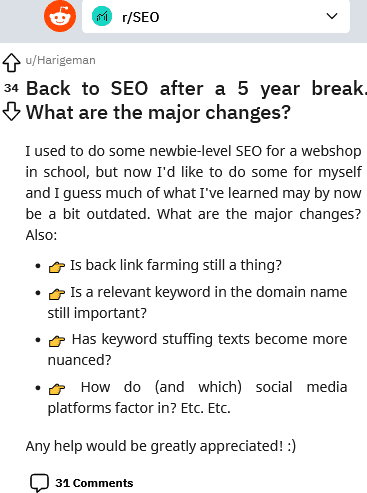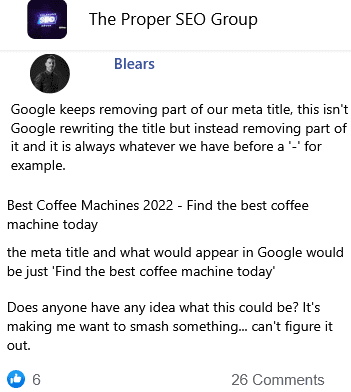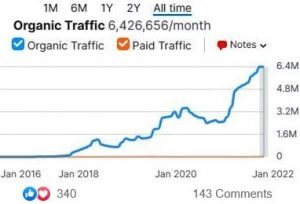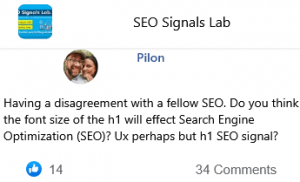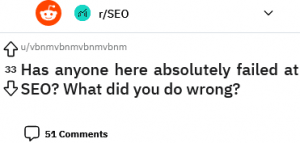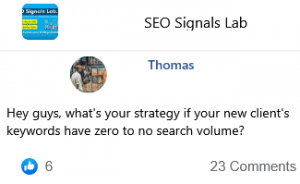To everyone that says the sandbox doesn't exist, why do you say that?
6 👍🏽1 🤯7
41 💬🗨
📰👈
Leaving aside the claims that G state it doesn't exist – From a real world point of view, having been an SEO for 15+ years, launching 4 or 5 new sites a month, every month, ranging in size from a few hundred pages to well over a million – every single site I have encountered (both the ones I manage day to day and sites where people have been shouting "sandbox") that has had difficulty with indexation and ranking – there has ALWAYS been an underlying, detectable issue with the site that has explained why it was having issues, and that when fixed – the site began to perform again.
I have only seen 2 exceptions, both sites rank and perform in Google, but took almost 18 months to get anywhere in Bing (which is very unusual, especially given they were also Exact Match Domain (EMD)'s which Bing is well known to favour). Bing search team had a look and despite saying "refer to our guidelines" (which neither site was in breach of) – we left them for a while and they eventually began to pick up – the only point of note about those 2 specific sites is they were location EMD's, 1 in China, the other in Singapore.
"Sandbox" is the go-to term for those that can't find/don't know the reason to why the site isn't ranking – not a "thing" that Google use to punish sites or "qualify them".
If you think a site is being sandboxed – you're not looking hard enough for the cause. Find/speak to other SEO users with experience in cleanups, rebranding, migrations etc – there are so many reasons a site can fail to rank, and not every SEO will experience all of the issues (including myself) – there is always some new weird and wonderful way an SEO or a Dev has screwed a a site up.
💟👍🏽18
What are the most common problems for you?
Peter » Robwood
With the sites I manage, in recent years (say the last 5 or so), Other than the Bing incident mentioned above – I haven't had any issues. With sites I get asked to look at, it varies quite a bit (as stated, there is no end of ways a dev or SEO can screw a site, directly or indirectly) – often see situations where people try to revive and repoint domains that were used heavily for spam, spun content at scale, excessive linking between sites owned by the same owner, stupid things like having noindex set sitewide, bad canonicalisation setups, bad hreflang setups, bad pagination setups, ad overload, japanese WP hacked, overuse/underuse of nofollow etc etc.
To generalise – its usually down to either a stupid/silly mistake, and/or a significant excess of a "tactic" or "strategy", and/or multiples of both.
Ben » Peter
I have an issue with one of my websites, the site was doing very well before 29 June, and after that most of the new and old articles don't rank in Google at all. That said the articles are indexed in Google but on the other side don't exist in G. I tried a lot to find when is the issue, however, I couldn't. Some people say that I have to keep publishing new content until G will again make my website ranks as it was before (the domain is any expired one)
Peter » Ben
You have a few choices – learn what and how to look for the problem yourself, pay someone to do it for you (and do exactly what they tell you to do to the site), or follow random advice from people that are guessing without finding the cause first.
Daniel » Peter
Totally agree. It's usually a convenient excuse for shit sites with shit content when Google hands them exactly what they deserve.
Joe » Peter
And every site you launched ranked within a week?
Peter » Joe
I've never made that claim (because it would be an inaccurate claim to make) – sites can and do sometimes rank that quickly. In my experience, it can take anywhere from days to around 3 months depending on size of site, type of build, niche etc to see significant indexation and ranking.
Joe » Peter
Totally agree buddy but just trying to clear up confusion.
Never seen a new site 'rank' anything in days. My definition of 'ranking' is top 5 BTW.
Got loads of aged sites where the opposite is true.
Peter » Joe
Ranking within days is very rare, and when it does happen, it's invariably a small sub niche, and/or a very small site, and/or branded. In general though, it takes time (it's complicated and there's a lot that needs to happen to determine rank in the first place (as you point out in your other comment with the Search Engine Journal (SEJ) post link)). "Taking time to rank" and "Sandbox" are very different terms – one is a fact, the other is invariably an excuse for lack of ability/knowledge/experience.
Morgan » Peter
Very well said!
📰👈
Roger
FYI, there is no research or patent to support the idea of a Sandbox. It is total speculation with zero evidence to support that Google or any other search engine would do such a thing. Zero.
Google's Mueller comments on the SEO Honeymoon hypothesis where SEO users say that Google will rank a new site to see if people like it AND the SEO Sandbox hypothesis that claims the opposite, that Google won't rank new sites.
So there are two contradictory hypotheses and Mueller comments on both of them. Neither of the ideas have any basis in reality in terms of research and patents. They are 100% speculation, people making things up.
As I said in one of those articles, the Sandbox in 2005 was probably an action Google took against low quality sites with low quality links or regular sites with crap links (like directories and reciprocals).https://www.searchenginejournal.com/mueller.../408994/
Mueller Touches on Google Sandbox and Honeymoon Ranking EffectsSEARCHENGINEJOURNAL.COM
Mueller Touches on Google Sandbox and Honeymoon Ranking Effects
But there are patents (on SEJ it's been covered), that talk about clusters and cluster 'maturity' and categorization.
https://www.searchenginejournal.com/content.../290129/Exploring the Role of Content Groups & Search Intent in SEO
SEARCHENGINEJOURNAL.COMExploring the Role of Content Groups & Search Intent in SEO
Roger » Joe
Never take what someone publishes at face value. Click through to the patent being discussed and read it yourself 🙂
Some people who write about patents don't know how to read them or cherry pick parts to support their preconceived ideas, ignoring the parts that contradict their ideas.
Click through to the PDF of the patent and you'll see that the patent being discussed was NOT filed by Google. It was filed by Palo Alto Networks, a firewall and cyber security company.
The URL filtering and clustering discussed in that article is in the service of a firewall.
"URL filtering can be a significant functionality of a security device (e.g., a firewall, integrated security appliance, Security gateway, router, and/or other network/security related device). "
I've read thousands of Google patents and research papers and none of them talk about a sandbox.
PLEASE read the articles I linked to. Matt Cutts checked out some of the sites being "afflicted" by the sandbox and noted that the algo was working as it should, meaning that these sites had something wrong with them. At the time, common SEO practice was to promote sites with directories, reciprocal links and paid links so it's very highly likely, because Google had just introduced STATISTICAL ANALYSIS on links around 2005ish, that the links were invalidating those sites.
Joe
Depends on what you mean by 'sandbox'.
Google has a process for crawling and scoring pages and depending on how much authority a site has it will determine the speed at which those pages rank.
Authority isn't built overnight.
Very good article that explains why content may take longer to rank on some sites than others:https://www.searchenginejournal.com/content.../290129/
Exploring the Role of Content Groups & Search Intent in SEOSEARCHENGINEJOURNAL.COM
Exploring the Role of Content Groups & Search Intent in SEO
See my post above. That is not a Google patent referenced in the article.
That patent belongs to a cyber security and firewall company.
Has nothing to do with Google.
The person who wrote that article made a mistake.
📰👈
Khan
Every site and niche is different, people targeting low volume or Keyword Golden Ratio (KGR) kinda keywords say sandbox don't exist, because they rank quick for those easy keywords. While people targeting high competition keywords cry about sandbox.
Asking for a opinion from people from variety of niches/industries doesn't make sense to me. If it's related to affiliate. Then my sites start ranking after 60-90 days without any links. If it takes longer, there is normally some issues with the site.
And yeah, I normally target low competition keywords in start. Once authority is built and site is aged, I go for bigger terms.
So you're saying the sandbox exists if you're greedy? 😃
Khan
Idk it's sandbox or what, but age is a ranking factor for sure. If it's just about content then 1 day old and 1 year old sites aren't equal. Whatever Google or others say I don't care, I'm talking from hundreds of sites I'm running.
Peter » Khan
I run hundreds of sites too – and yes, domains that have been live longer tend to rank higher than newer sites. Domain age occurs due to time – it's not something you can manufacture in a bid to avoid the mythical sandbox. The sites I run are mainly high volume/high competition – whilst they don't rank in a week, and do take time to get there, it's not because there is any sandbox – rankings essentially need to be earned, and that earning of ranking takes time – the more competitive those terms are, the longer it takes – again, there is not a sandboxing mechanism controlling that.
Drew
I think most of us use the term metaphorically these days to refer to the fact it can take a while to take off on Google sometimes.
Old school SEO users seem to get hilariously worked-up by people using it as a metaphor because they're still crawling around looking for a physical box full of sand somewhere in Google headquarters.
👍🏽🤭10
This got me laughing hard 🤣
Peter » Drew
On behalf of "old school SEO users" everywhere – we're just tired of explaining it to people that can't bothered to look beyond the guestimated metrics tools provide, and the morons that perpetuate the never ending barrage of Search Engine Optimization (SEO) myths that won't die.
Eric
New sites lack "authority" because the have spread the "signals" that older sites have. So, they have huge challenges that are created by being "new"– not because of a "sand-box." Right now I'm dealing with a very big site that isn't ranking after 2 months with a brand new domain and new content. That is the issue for it (as well as maybe bad onsite and technical SEO until I just starting doing a serious audit).
Callum
Because while there are a lot of viable reasons why a site will take a while to get off the ground, there isn't a sandbox activity holding you back.
It's a concept made up by SEO users who have impatient clients and they want to people please imo.
🤭👍🏽2
Adeola
I have seen a new site got picked up after 2months with lot of contents published on the blog.
I feel it all depends.
Whether sandbox or no sandbox, Google indexing your site fast is the only way you can rank faster
So if everything is set, the social signals especially + the keywords. Either low or high competitive keywords.. You can pretty rank very fast
That's my experience
Makatowicz
Sandbox mode is a natural result of low authority on new pages. It has to be like this because of the way Google's algorithm works. You don't give a surgeon that has never done an operation a go with the most complex operation there is. This is why authority usually slowly builds over time and, it requires some authority to rank for most search queries. So when the authority on a web page is considerably lower than competitors and others in the niche, we call it sandbox. Nothing has been done to the page. It is just the way ranking works. Good on-page SEO is not good enough when the competition is high. It shouldn't be like that, but it just is.
📰👈
How to Create a Website with Your Money or Your Life (YMYL) Niche?
The Most Important Tool in Search Engine Optimization (SEO)




